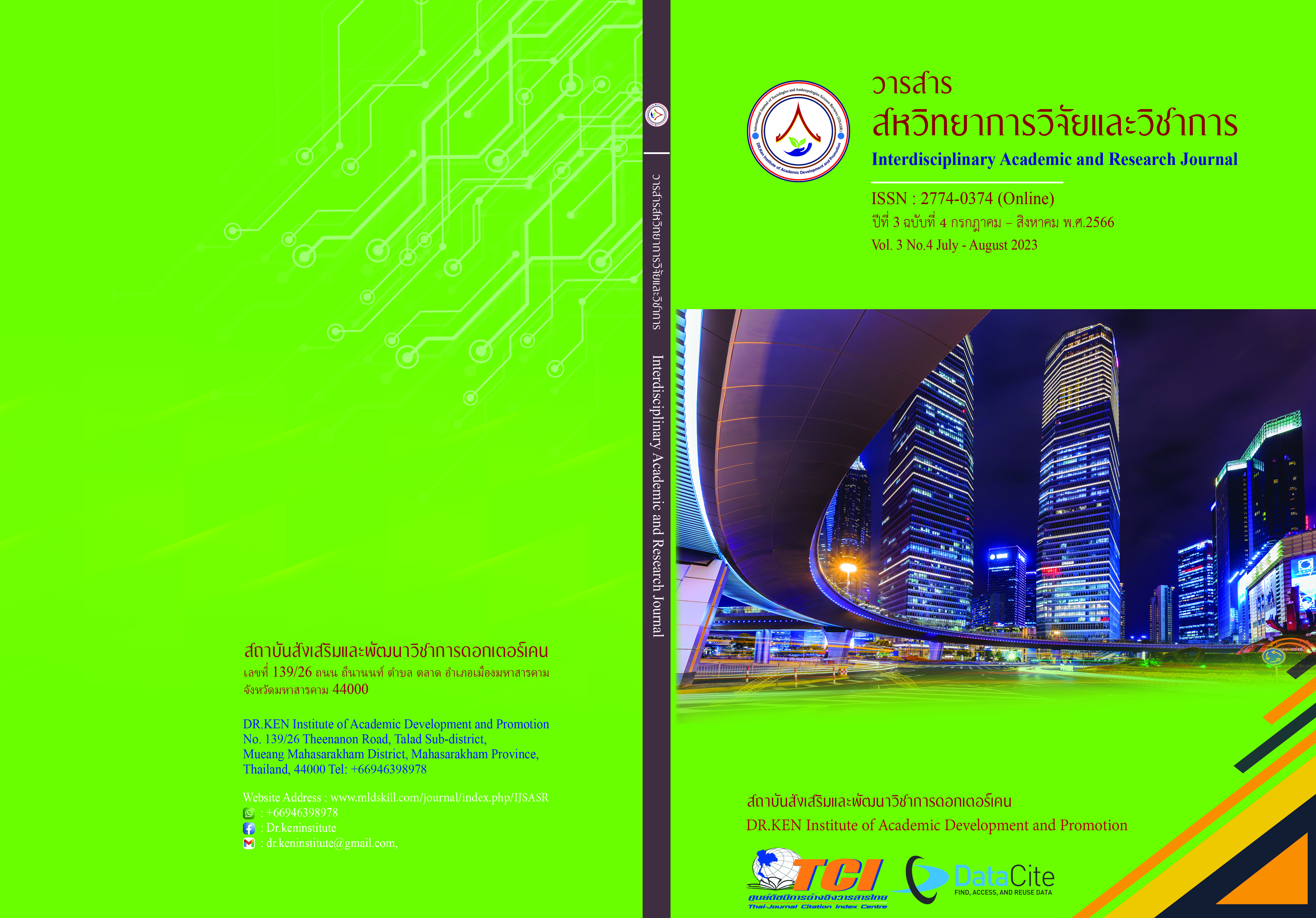The Development of MEAs Learning Management that Affects Learning Achievement Math and Problem-Solving Skills on Univariable Linear Equation with Kahoot Application of Mathayomsuksa 1 Students
DOI:
https://doi.org/10.14456/iarj.2023.1ึ73Keywords:
MEAs Learning Management; , Achievement Math; , Problem-Solving Skills; , Kahoot ApplicationAbstract
Management of Model Eliciting Activities (MEAs) to solve problems by converting problems from the real world to mathematical problems, then linking mathematical knowledge to problem-solving, known as mathematical modeling. Mathematical connections in various ways by students can be applied to build confidence in working and solving mathematical problems as well as everyday situations. Thus, this research was to develop a learning management method using MEAs that affected learning achievement. and problem-solving skills in mathematics on linear equations in one variable in conjunction with the Kahoot application of grade 1 students. The objectives of this research were 1) to develop a MEAs learning management on one-variable linear equations; in conjunction with the Kahoot application of Mathayomsuksa 1 students to ensure that their efficiency meets the specified criteria 75/75. 2) Compare the learning achievements before and after the MEAs with the Kahoot application. 3) Compare the mathematical problem-solving skills Before and after the MEAs with the Kahoot application. The sample used in the research was Mathayomsuksa 1/7 students, semester 2, academic year 2022, Buakaw School. Kalasin Province, 33 people were obtained by cluster random sampling. The research tool was the learning management plan. Achievement tests and problem-solving skill observation from mathematical. the statistics used in the research were mean, and standard deviation. Determination of E1/E2 efficiency and t-test dependent. The research results found that 1) MEAs Learning Management on Univariable Linear Equations together with the Kahoot application of Mathayomsuksa 1 students had the criterion efficiency (E1/E2) of 75.78/76.30, indicating that the MEAs learning management on single variable linear equations together with the Kahoot app, it has a 75/75 benchmark performance.2) the problem-solving skills after school were higher than before. Statistically significant at the .05 level and 3) the student's learning achievement after school was higher than before. Statistically significant at the .05 level.
References
กระทรวงศึกษาธิการ. (2551). หลักสูตรแกนกลางการศึกษาขั้นพื้นฐาน พุทธศักราช 2551. โรงพิมพ์คุรุสภาลาดพร้าว.
กระทรวงศึกษาธิการ. (2560). ตัวชี้วัดและสาระการเรียนรูแกนกลาง กลุ่มสาระการเรียนรู้คณิตศาสตร์ (ฉบับปรับปรุง พ.ศ. 2560) ตามหลักสูตรแกนกลางการศึกษาขั้นพื้นฐาน พุทธศักราช 2551. โรงพิมพ์คุรุสภาลาดพร้าว.
ขวัญหทัย พิกุลทอง. (2562). Model Eliciting Activities การจัดการเรียนรู้ทางคณิตศาสตร์เพื่อพัฒนาความสามารถในการแก้ปัญหาสำหรับนักเรียนไทยในยุคการศึกษา 4.0. วารสารศึกษาศาสตร์ มหาวิทยาลัยนเรศวร, 21(3), 342-355.
ชัยยงค์ พรหมวงศ์ (2556) การทดสอบประสิทธิภาพสื่อหรือชุดการสอน. วารสารศิลปากรศึกษาศาสตร์วิจัย. 5(1), 5-20.
ชูศรี วงศ์รัตนะ (2560) เทคนิคการใช้สถิติเพื่อการวิจัย. (พิมพ์ครั้งที่ 13). ศูนย์หนังสือจุฬาลงกรณ์มหาวิทยาลัย.
ธัญญ์ฐิตา วงษ์เคี่ยม และพาสนา จุลรัตน. (2563). ผลของการใช้โปรแกรม Model – Eliciting Activities เพื่อเสริมสร้างความคิด สร้างสรรค์ทางคณิตศาสตร์ ของนักเรียนชั้นประถมศึกษาปีที่ 5. วารสารการวัดผลการศึกษา มหาวิทยาลัยศรีนครินทรวิโรฒ. 37(101), 202-215.
พรพิมล แก้วฟุ้งรังษี. (2564). คู่มือประกอบการอบรมหลักสูตรสร้างกิจกรรมการเรียนแบบมีส่วนร่วม. Retrieved from: https://www.digital.cmru.ac.th
วิฬาร์ เลิศสมิตพร. (2558). ผลของการจัดกิจกรรมการเรียนรู้คณิตศาสตร์ตามแนว Model-Eliciting Activities ที่มีต่อความสามารถในการถ่ายโยงการเรียนรู้และความสามารถในการแก้ปัญหาทางคณิตศาสตร์ของ นักเรียนมัธยมศึกษาปีที่ 2. วิทยานิพนธ์ปริญญามหาบัณฑิต: จุฬาลงกรณ์มหาวิทยาลัย.
ศุภกร กองเป้า และอัจฉริยา พรมท้าว. (2565). การพัฒนากิจกรรมการเรียนรู้แบบร่วมมือเทคนิค TGT ร่วมกับโปรแกรม Kahoot เรื่อง ประเด็นสำคัญทางประวัติศาสตร์ไทย สำหรับนักเรียนชั้น มัธยมศึกษาปีที่ 4. ใน อภิเศก ปั้นสุวรรณ (บ.ก.), NEW NORMAL, NEW THINKING, NEW CHALLENGES. การประชุมวิชาการระดับชาติ SMARTS ครั้งที่ 11 (น. 619-630). คณะอักษรศาสตร์ มหาวิทยาลัยศิลปากร.
ศุภกร กองเป้า และอัจฉริยา พรมท้าว. (2565). การพัฒนากิจกรรมการเรียนรู้แบบร่วมมือเทคนิค TGT ร่วมกับโปรแกรม Kahoot เรื่อง ประเด็นสำคัญทางประวัติศาสตร์ไทย สำหรับนักเรียนชั้น มัธยมศึกษาปีที่ 4. วิทยานิพนธ์ปริญญามหาบัณฑิต: มหาวิทยาลัยราชภัฏมหาสารคาม.
สถาบันทดสอบทางการศึกษาแห่งชาติ(องค์การมหาชน). (2564). รายงานประจำ ปี 2564. สถาบันทดสอบทางการศึกษาแห่งชาติ(องค์การมหาชน). Retrieved from: https://www.niets.or.th/uploads/content_pdf/pdf_1571281594.pdf
สุวพัชร โพธิ์ปิ่น. (2564). การจัดการเรียนรู้ตามแนวคิด Model Eliciting Activities เพื่อส่งเสริมความสามารถในการแก้ปัญหาทางคณิตศาสตร์สำหรับนักเรียนชั้นประถมศึกษาปีที่ 2. วิทยานิพนธ์ปริญญามหาบัณฑิต: มหาวิทยาลัยศิลปากร.
สุวพัชร โพธิ์ปิ่น. (2565). การจัดการเรียนรู้ตามแนวคิด Model Eliciting Activities เพื่อส่งเสริมความสามารถในการแก้ปัญหาทางคณิตศาสตร์สำหรับนักเรียนชั้นประถมศึกษาปีที่ 2. วารสารวิจัยรำไพพรรณี มหาวิทยาลัยศิลปากร, 16(1), 190-199.
Eric, & Ming, C.C., (2008). The Use of Mathematical Modelling Tasks to Developing Creativity. Proceedings of the Discussing Group 9 Promoting Creativity for all students in Mathematics Education of the 11th International Congress on Mathematical Education. Mexico, 207 – 216.
Lesh, R. & English, L. D. (2005). Trends in the evolution of models and modeling perspectives on mathematical learning and problem-solving. In H. Chick & J. Vincent (Eds.), Proceedings of the 29th Annual Conference of the International Group F.
Showalter, Q. (2008). The effect of model-eliciting activities on problem-solving process and student disposition toward mathematics. United States: University of Kansas.
Wahyuningrum, E., & Suryadi, D. (2014). Association of Mathematical Communication and Problem-Solving Abilities: Implementation of MEAs Strategy in Junior High School. SAINSAB, 17(1), 38-50.
Downloads
Published
How to Cite
Issue
Section
License
Copyright (c) 2023 Kitsadakorn Chotchan, Atchariya Promtow, Jeeranan Senajak, Akkharaphong Wongphat, Jenjira Puiwong, Nunthaporn Yingratanasuk

This work is licensed under a Creative Commons Attribution-NonCommercial-NoDerivatives 4.0 International License.
Copyright on any article in the Interdisciplinary Academic and Research Journal is retained by the author(s) under the under the Creative Commons Attribution-NonCommercial-NoDerivatives 4.0 International License. Permission to use text, content, images, etc. of publication. Any user to read, download, copy, distribute, print, search, or link to the full texts of articles, crawl them for indexing, pass them as data to software, or use them for any other lawful purpose. But do not use it for commercial use or with the intent to benefit any business.
















.png)


